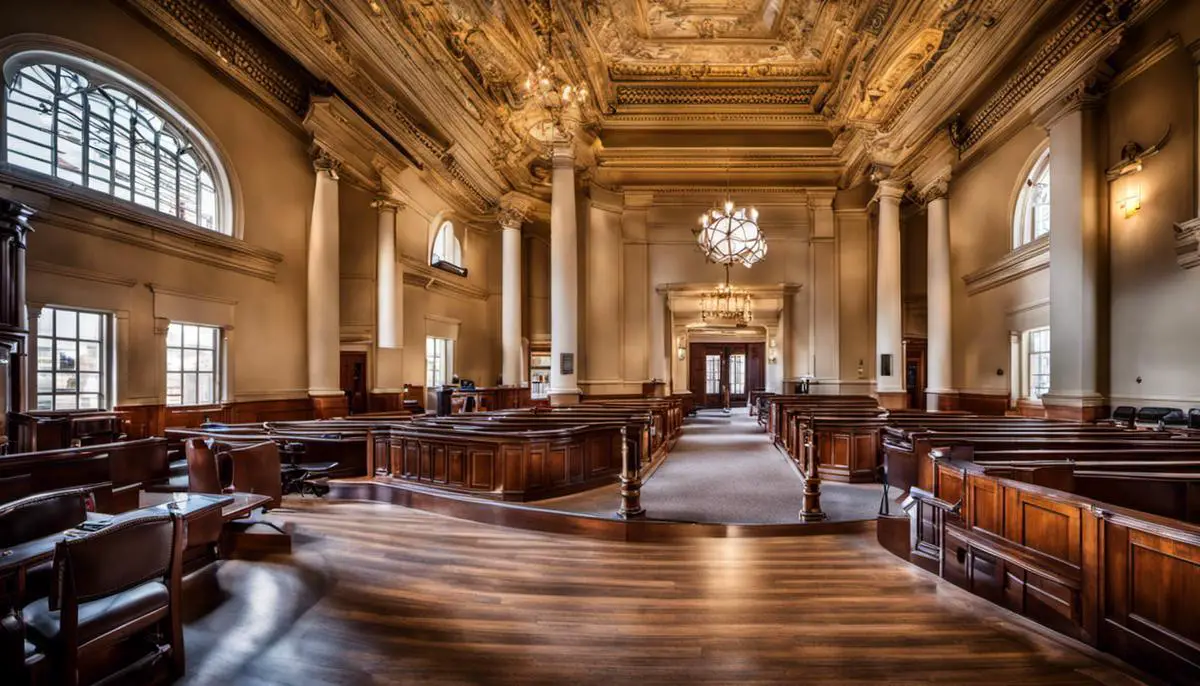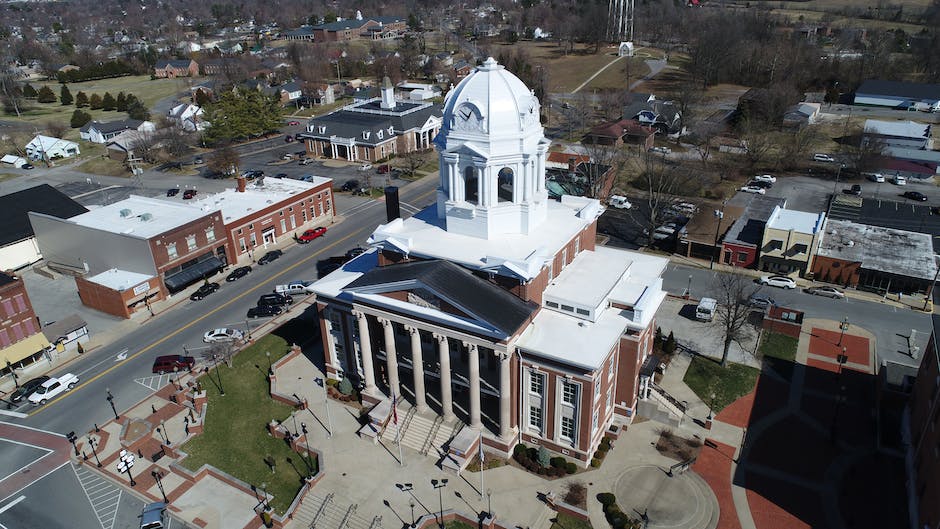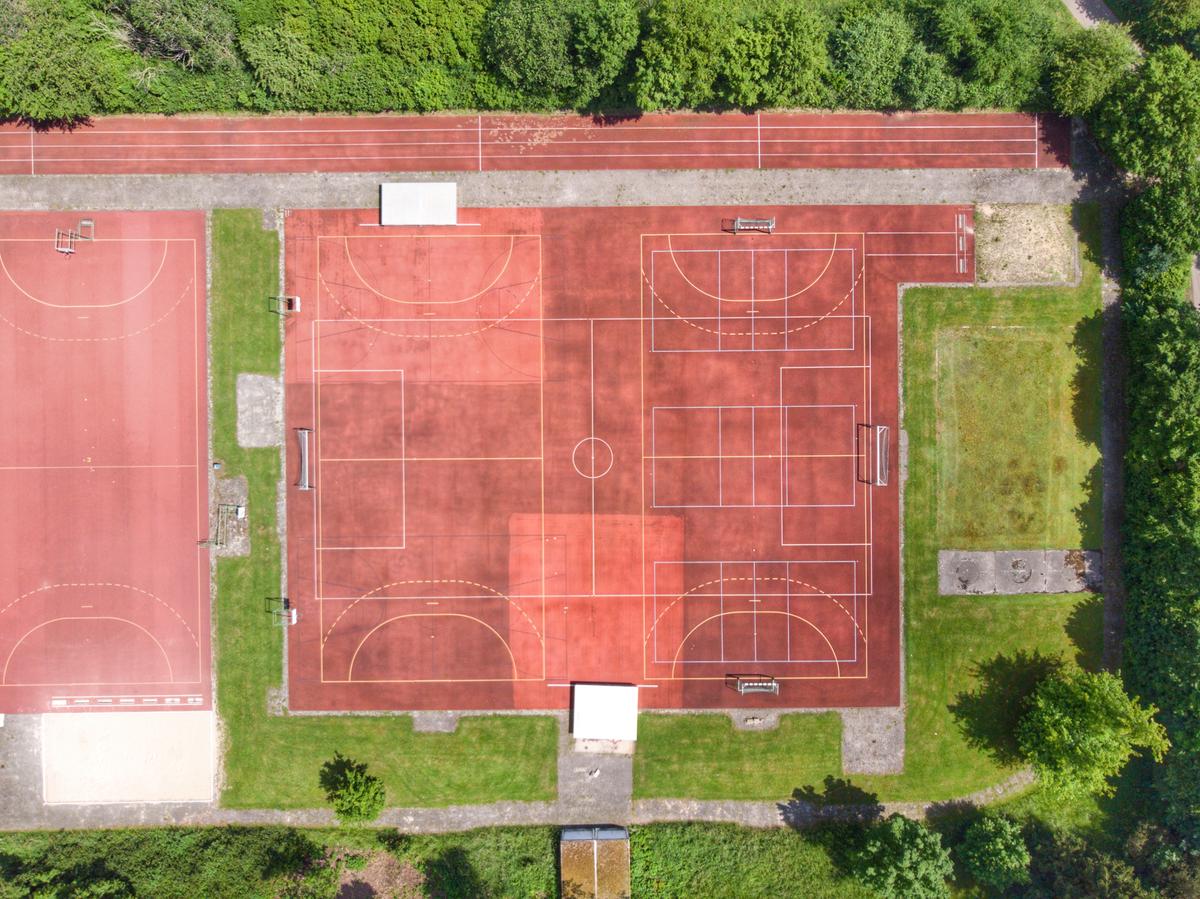Delving into the labyrinthine world of Reno courts, this exploration serves as a guide to decode their history, structure, and notable case profiles, providing an insight into the integral elements and intricacies of Nevada’s legal framework. From the nascent stages of Reno’s court evolution to their current structural makeup – encompassing municipal, justice and district courts – this journey traverses the nuanced landscape of jurisdiction and responsibilities apportioned among these courts. Unveiling the procedural aspects of Reno court trials, this narration endeavors to demystify the initiatory appearances, sequential pre-trial hearings, trails, sentencing, and appeals processes. Furthermore, this account chronicles impactful cases that have imprinted significant societal and legal repercussions, elucidating the profound influences Reno courts wield.
History and Structure of Reno Courts
The Historical Evolution of Reno Court System
In the mid-19th century, when Reno, Nevada was founded, it immediately required a judiciary to maintain law and order. Initially, a one-story frame building served as the first courthouse for the region, indicating the inception of the Reno court system.
The court system of Reno, similar to other cities in Nevada, functions within the larger jurisdiction of the Nevada judiciary. Its structure and evolution have been shaped not only by local needs, but also by the wider legal requirements of the State of Nevada.
In the early 1900s, the Washoe County courthouse was built, which has been a symbol of the region’s justice system to date. Over the years, the court system has adapted to changes and developments in law enforcement and administration, keeping pace with the growing population.
Types of Courts in Reno
There are three primary types of courts in Reno: Municipal Court, Justice Court, and District Court. Each type of court has a specific role to play in the judiciary and are entwined to form a comprehensive legal system.
Municipal Court
The Reno Municipal Court is responsible for handling cases involving violations of city ordinances. This usually includes traffic violations, disorderly conduct, minor civil disputes, and other misdemeanors committed within the city’s limits. The Municipal Court does not have jurisdiction over felonies or divorce cases.
Justice Court
Anyone charged with a gross misdemeanor, a felony, or a non-traffic misdemeanor starts their journey through the justice system from the Reno Justice Court. This court also oversees small claims cases, evictions, temporary protective orders, and civil matters of $15,000 and under.
District Court
The Second Judicial District Court of Washoe County, which includes Reno, presides over not only criminal and civil matters but also family and probate matters. It is the primary trial court and hears cases that exceed the jurisdiction of municipal and justice courts.
Understanding Reno Courts’ Jurisdiction and Responsibilities
Under the umbrella of Nevada’s judicial system, the courts in Reno carry out their functions, with each court’s domain primarily determined by the severity of the case. Typically, minor cases are handled by the municipal court, while severe ones are assigned to the district courts. Operating in the middle are justice courts, also recognized as the non-record courts in Reno.
Safeguarding individual rights, adjudicating upon the guilt or innocence of accused individuals, interpreting constitutional provisions and statutes, resolving legal disputes, and ensuring equitable treatment of all appearing before Reno courts are the comprehensive responsibilities they uphold. The smooth functioning and success of these responsibilities lie in the core roles played by judges, prosecutors, public defenders, court reporters, and clerks.

Reno Court Processes and Procedures
Experiencing the Initial Appearances in Reno Courts
The initial court appearance represents the inaugural stage of the judicial process in Reno. During this phase, the defendant is acquainted with the charges being brought against them directly by the court. In addition, the presiding judge explains the rights they are entitled to – the right to engage an attorney, or in case they are unable to afford one, to be represented by a court-appointed attorney.
Pre-trial Proceedings
Pre-trial proceedings refer to a range of potential events. This may include various motions, hearings, and conferences. It is during this stage that a defendant may consider entering a plea bargain. Additionally, discovery can also take place, where each side gathers and shares their evidence with the other party.
A significant part of pre-trial processes is bail determination, where the court decides if the defendant can be released before trial and, if so, under what conditions. The aim is to ensure that the accused appears at trial and reduces the risk posed to the community.
Trials in Reno Courts
If a case proceeds to trial, the defendant has the option of a bench trial (where the case is decided by a judge) or a jury trial (where a group of peers decides). The prosecutor presents evidence to prove the defendant’s guilt while the defense lawyer contests these allegations. Both sides are given an opportunity to cross-examine the other party’s witnesses.
Sentencing Procedures
If the defendant is found guilty at trial or through a plea agreement, then sentencing will take place. This usually happens at a separate hearing, where the judge determines the appropriate punishment based on several factors, including the circumstances of the crime, the defendant’s criminal history, as well as the impact on the victim. Sentence could involve jail time, fines, probation, community service, or a mix of these.
Appealing a Decision in Reno Courts
The final stage in the legal process is the appeal. If a defendant feels that a legal error occurred during the trial, depending on the law, they may appeal the case to a higher court, like the Nevada Court of Appeals or the Supreme Court of Nevada. During an appeal, the appellate court can review the case to determine if there were legal errors that could have impacted the verdict or sentence. However, it is important to note that an appeal is not a new trial and the higher court does not evaluate the facts of the case again.
In the auspices of Reno courts, each progression in a legal dispute adheres to strict rules and deadlines. Whether you are defending a case or pursuing a legal claim, comprehending these stages and their corresponding parameters is essential.

Noteworthy Cases and Impacts
An Iconic Reno Court Case: The United States v. Lomax
Serving as a key legal battle over First Amendment rights in Reno courts, United States v. Lomax pivoted around a Reno-based individual engaged in creating and distributing rap music perceived as promoting hostility towards law enforcement. The crux of the matter was the distinction between freedom of speech and instigating violence.
In this noteworthy case, the Justice Department highlighted lyrics that seemingly advocated violent acts towards specific police officers. In a landmark ruling, the judge established that artistic expression may verge into unlawful actions when it stimulates the threat of imminent violence. This ruling has stirred up significant implications for freedom of speech and expression, prompting a careful equilibrium between fostering creativity and compromising public safety.
The Burning Man Case: Pershing County v. Black Rock City
Perhaps one of the most significant legal battles concerning the legendary Burning Man festival took place in a Reno court. Black Rock City, the festival’s organizer, got entangled with Pershing County over law enforcement services for the week-long event in Nevada’s Black Rock Desert.
In 2012, Pershing County sought to impose ordinances and increase fees on the festive event arguing the festival was burning through their resources. The court, however, upheld the festival’s First Amendment rights and maintained that county ordinances did not apply. It set a significant legal precedent that will guide the future of the iconic festival.
Nevada Supreme Court: Guinn v. Legislature of State of Nevada
Though it happened in 2003, the Guinn v. Legislature of State of Nevada case left a significant mark on Nevada’s legal landscape, with the nerve of the battle hitting Reno courts as well. The Nevada Supreme Court, seated in Carson City, redacted its controversial decision that Governor Kenny Guinn could order the state’s Legislature to increase taxes.
Eventually, the court acknowledged that this ruling was conflicting with the Nevada Constitution’s supermajority requirements for tax hikes. The reversal of the decision carried significant implications for the state’s appropriation process and the Separation of Powers Doctrine.
The Reno courts are actively engaged in a broad range of complex and sometimes groundbreaking legal cases. These cases not only shape local legislation, but also influence national legal discourse. Areas such as First Amendment rights and the powers of the state are among the many that have been examined within the precincts of Reno courts.

Accessing Services of Reno Courts
Embracing the Digital Era: How Reno Courts Serve the Public
Reno Courts have adapted to today’s digital age, offering comprehensive judicial services to locals and people residing out-of-state. These services encompass everything from retrieving court records to initiating legal proceedings and paying due fees online, thereby enabling people to interact with the judicial system from anywhere and at any time.
Residents can access court records by visiting Reno Court’s designated online portal. After setting up an account, users can readily search and view court records within a specified timeline. Regular updates ensure that the provided information is always accurate and up-to-date.
Reno Courts also facilitate online court filings. This digital service simplifies the otherwise tedious process of submitting legal documents, eliminating the need for physical presence at the courthouse and reducing paperwork. Users can submit various types of documents such as initial complaints, motions, and pleadings. To start, all one needs is to create an account on the court’s official website and follow the furnished instructions.
For fines, bail and other court-related payments, Reno Courts operate an online fee payment platform. It not only offers secure payment options including credit cards, debit cards, and electronic checks, but is also designed to be user-friendly for all to use.
Acknowledging the benefits of digital communication, Reno Courts host virtual proceedings through video conferencing platforms for certain types of cases. This concept has proven to be integral, particularly in the face of present-day social distancing norms, ensuring that court proceedings continue without delay.
Moreover, Reno Courts have developed online self-help resources for individuals representing themselves in court. These user-friendly tools provide instructions, forms, and answers to common questions, helping make legal processes more comprehensible for the general public.
In conclusion, the digital services provided by the Reno Courts efficiently bridge geographical barriers, making judicial services more readily available. The efficient use of digital technology by Reno Courts is a commendable benchmark in ensuring everyone’s access to justice, anytime, anywhere.

Photo by julian_ebert on Unsplash
Democratizing justice, Reno courts have extended services making them accessible to not only its local residents but also out-of-state populace. Belonging to the digital age, these courts are facilitating access to records, filing cases and fee payments online, thereby redefining the practice of law and delivering justice. Additionally, the Reno court system has been a trailblazer in embracing digital transformation thereby setting a commendable benchmark. Hence, the transparency vouched for through such streamlined, digitally-enabled processes bear testimony to the system’s openness, efficiency and its commitment to serving justice and empowering society at large.

I am Michael Wanner, an experienced and educated expert in the field of pickleball. I hold a degree in Sports Science from Cleveland State University, Ohio, USA. My expertise lies in the technical aspects of pickleball and how to play it effectively. I have spent many years playing and coaching pickleball and have a wealth of knowledge to share with my readers. I am a valuable resource for anyone looking to improve their pickleball skills and strategies.
